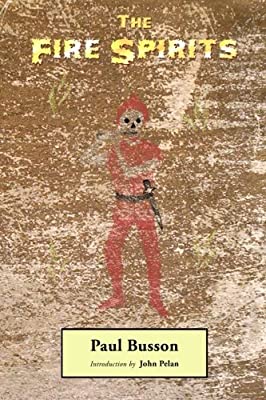 By PAUL BUSSON (Ramble House; 1929/2015)
By PAUL BUSSON (Ramble House; 1929/2015)
A most unique German-centric exercise in historical horror that’s become a prized collector’s item over the years due to its place of honor in Robert Edward Wagner’s horror fiction listings (it’s the #3 entry) in the Twilight Zone Magazine’s fabled “Fantasy Five-Foot Bookshelf.” I say Wagner’s praise is a bit overdone, given that THE FIRE-SPIRITS, in its present form at least, is noticeably flawed.
The set-up: during the Napoleonic wars the young Peter Storck heads to Sankt Marein, an isolated village in the Tyrol region. He’s seeking to investigate the inexplicable disappearance of his uncle Martin from the latter’s home in Vienna, which Peter has inherited. Uncle Martin apparently relocated to Sankt Marein, where, Peter learns, he become a hermit, and immersed himself in all manner of unsavory practices.
During his stay in Sankt Marein Peter is roped into the patriotic struggles of the locals, who are upset about Tyrol being handed over by the Catholic emperor of Austria to the protestant king of Bavaria, and stage several military uprisings in protest. Peter is reluctant to join these battles, and demurs as long as he can, but eventually picks up arms himself—much to his everlasting regret. There are also the titular “spirits,” fiery shapes said to be the souls of those condemned to Hell, that appear twice a year to haunt the villagers. There’s also Julia, a young woman whose doings are as odd and mysterious as those of Peter’s uncle, and who may hold the key to the many mysteries surrounding the village, as well as Peter’s own rather mysterious lineage.
The book has its share of good things: the characterizations are quite strong, the descriptions of the village and its surrounding regions vivid and atmospheric, and the depictions of warfare appropriately stark and gritty (of course, a working knowledge of European history is required to fully comprehend the hows and whys of the novels’ many battles). The problems are mostly in the storytelling arena.
The English version of THE FIRE-SPIRITS was heavily abridged from the German language original, which is evident in the disjointed narrative. Peter’s early journey to Sankt Marein was evidently truncated, and a dog he takes great pains to rescue early on in the text is barely mentioned from then on. Furthermore, the various plot strands, including the mystery of the fire spirits, the doings of Peter’s uncle and the villagers’ misguided patriotism, are poorly integrated, resulting in a novel that in spite of its virtues is ultimately unsatisfying.
